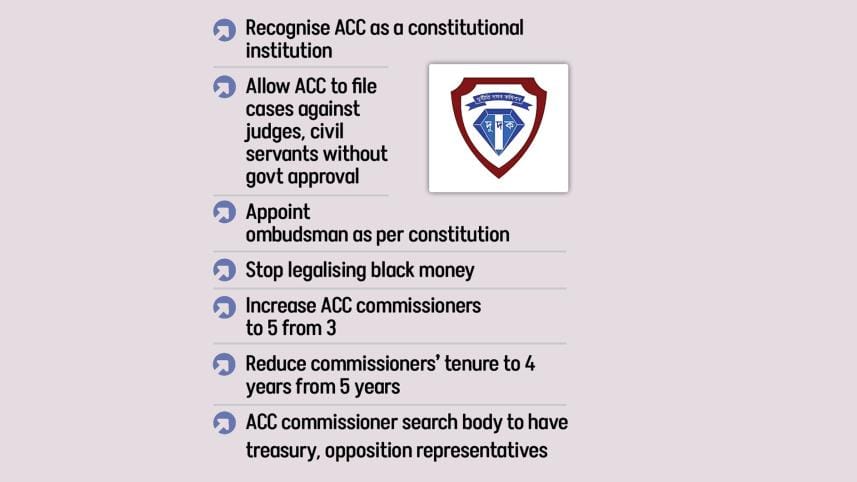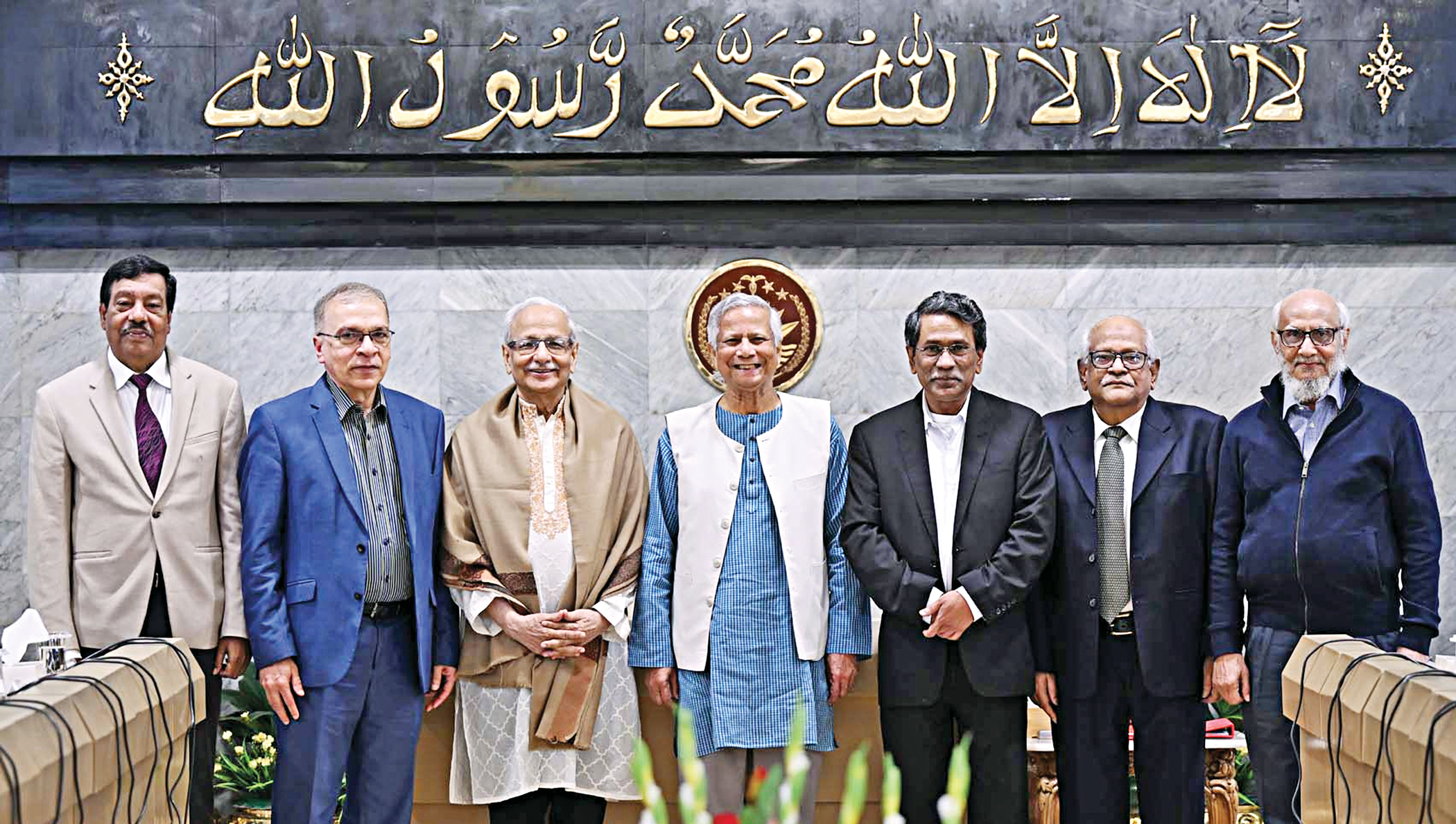ACC Reform: Structural, legal overhaul stressed

The Anti-Corruption Commission (ACC) Reform Commission yesterday proposed significant changes to the ACC's structure and operations, while also recommending some constitutional amendments to stop power abuse by the government of the day.
The reform commission also wants elimination of provisions for whitening black money.
Led by Iftekharuzzaman, executive director of Transparency International Bangladesh, the commission recommended the enactment of several laws and amendments to some existing ones.
In all, it presented a set of 47 recommendations to strengthen the ACC.
The reform commission proposed that the ACC be recognised as a constitutional institution, by upgrading its current status of a statutory body. Also, in the proposal is establishment of an ombudsman, as already mandated by the constitution, to implement a national anti-corruption strategy.
The commission submitted the report to Chief Adviser Prof Muhammad Yunus at his office yesterday.
Three other reform commissions on constitution, Election Commission, and police also submitted their reports to the chief adviser.
"After the fall of the kleptocratic government in the glorious July '24 uprising, Bangladesh is now at a critical juncture of a new journey. As part of state reform in shaping this new journey, there is no alternative to an independent, impartial, and effective Anti-Corruption Commission," reads the synopsis of the ACC reform commission's report.
The report comes amid allegations of corruption and money laundering by some people affiliated with the previous Awami League government.
Since the ouster of Sheikh Hasina on August 5, 2024, in a popular uprising, dozens of corruption cases have been filed against the four-time PM herself, some of her family members, cabinet colleagues and party leaders.
The issue of ACC's failure to prevent corruption over the years also came to the fore, prompting the interim government to form a reform commission to come up with recommendations to strengthen the ACC.
"An institution like the Anti-Corruption Commission alone cannot control corruption in any country, including Bangladesh. An appropriate state and social environment are needed to make a nation free of corruption," Iftekharuzzaman said while handing the report to the chief adviser.
Later at a press conference at the TIB office in the afternoon, he said they made the 47 recommendations in three different categories.
"For implementation, short-term (6 months), medium-term (18 months), and long-term (48 months) roadmaps have been proposed. We believe that it is possible to implement these recommendations within the given timeframe," he said.
The reform commission recommended amending article 20 (2) of the constitution to ban misuse of constitutional and legal authority for personal interest, asking the authorities to add this sentence in the constitution: "The state will create a situation where, as a general rule, no individual can misuse constitutional and legal powers for personal interests."
It also proposed drafting a national anti-corruption strategy replacing the existing National Integrity Strategy, specifying responsibilities and duties of different government and non-government organisations in combating corruption.
Additionally, it recommended formulating a law to prevent conflicts of interest to stop the misuse of state and legal powers.
The commission also wants some changes in the electoral code to bring transparency in political activities and polls expenditure. It called for making submission of financial statements by candidates and their family members mandatory and engaging the National Board of Revenue and the ACC to check those.
On ACC formation, it recommended increasing the number of ACC commissioners to five from the existing three, with at least one female commissioner.
The term of the commissioners has been proposed four years, instead of the current five.
A seven-member permanent search and review committee has been proposed to pick the commissioners and periodically review the ACC activities.
The search committee will be formed with the senior most judge of the Appellate Division of the Supreme Court (except the chief justice) and the senior most High Court judge nominated by the chief justice, Comptroller and Auditor General of Bangladesh, chairman of Bangladesh Public Service Commission, two representatives nominated by the leader of the parliament and opposition leader respectively, and civil society member having experience in anti-graft and government activities.
The existing law stipulates a five-member committee comprised of two judges of the Appellate Division and High Court Division nominated by the chief justice, CAG, PSC chairman and the immediate past cabinet secretary.
As for the qualification of the commissioners, it said apart from the candidates from the background of law, education, administration, judiciary, law enforcement agencies, people having at least 15 years' experience in financial institution, audit, governance or anti-corruption activities will be eligible for the post. As per the existing law, candidates must have 20 years of experience.
The ACC will have to submit a report to the seven-member search and review committee every six months and the committee will hold a public hearing on the report and give their evaluation as a measure to monitor their activities, the reform commission report says.
In a shift from the existing practice, the reform commission proposed filing a case first and then begin investigation if the allegations fall under its jurisdiction.
The commission also recommended amending the section 20 of the ACC act to allow police to take over the matter when appropriate.
It also wants repeal of 32(Ka) of the ACC act – a provision that bars the ACC from filing cases against judges and public servants without prior approval from relevant authorities.
It said the section 32(Ka) which was added to the law in 2013 through an amendment to the act is "discriminatory" and "goes against the independence of ACC". Besides, the High Court already declared the section unconstitutional and ordered repealing it.
The reform commission suggested establishing special judges' court in every district where the ACC has its offices for quick disposal of the cases. Currently, the ACC has offices in 36 districts.
It proposed increasing the number of director general from eight to 12 immediately.
To appoint ACC secretary, the commission recommended a competitive and open process through advertisement.
It also suggested a separate pay scale for the ACC. The salary of ACC's officers and staff would be at least twice the national pay scale.
The commission also recommended abolishing section 54(2) of ACC Karmachari Chakuri Bidhimala, saying that the employees cannot work independently because of the section. Under the section, the ACC can terminate an employee without issuing any show cause notice.
Speaking at the press briefing, Iftekharuzzaman said, "We are hopeful that our recommendations will be implemented."



 For all latest news, follow The Daily Star's Google News channel.
For all latest news, follow The Daily Star's Google News channel. 
Comments